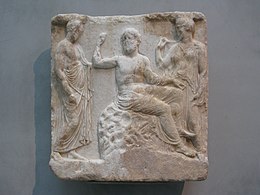
In Greek mythology, Epione (Ancient Greek: Ἠπιόνη, romanized: Ēpiónē, lit. 'soothing') is a minor health goddess, the wife of Asclepius, the Greek god of healing and medicine.
Mythology
Her name is derived from the word ἤπιος (epios, "soothing"). Epione was the personification of the soothing of pain and the care needed for recovery. With Asclepius, she was the mother of the five Asclepiades: Aceso, Aglaea, Hygieia, Iaso, and Panacea, as listed in the Suda. She also had two sons, Machaon and Podalirius, who are mentioned in the Iliad of Homer as well as Telesphoros.
Epigraphical evidence suggests that Epione was a cultic figure in Athens, Epidauros, Kos, and Pergamon. Asclepius and Epione both had marble statues in Argolis, where Asclepius was widely worshipped.
See also
References
- ^ Mylonopoulos, Ioannis. "Epione". The Encyclopedia of Ancient History.
- Suda, "Epione"
- Grant, Michael; Hazel, John (2002). Who's Who in Classical Mythology. ISBN 9780415260411. Retrieved 2011-09-17.
- Pausanias, 2.29.1; Scholiast on Pindar's Pythian Odes 3.14
Sources
- "Suida", Suda Encyclopedia translated by Ross Scaife, David Whitehead, William Hutton, Catharine Roth, Jennifer Benedict, Gregory Hays, Malcolm Heath Sean M. Redmond, Nicholas Fincher, Patrick Rourke, Elizabeth Vandiver, Raphael Finkel, Frederick Williams, Carl Widstrand, Robert Dyer, Joseph L. Rife, Oliver Phillips and many others. Online version at the Topos Text Project.
External links
| Ancient Greek deities | |||||||||||||
|---|---|---|---|---|---|---|---|---|---|---|---|---|---|
| Early deities | |||||||||||||
| Titans |
| ||||||||||||
| Olympian deities |
| ||||||||||||
| Water deities |
| ||||||||||||
| Personifications |
| ||||||||||||
| Other deities |
| ||||||||||||
This article relating to Greek mythology is a stub. You can help Misplaced Pages by expanding it. |